 MyDogBreeds
MyDogBreedsBoth Other and Miniature Siberian Husky are originated from United States. Other may grow 51 cm / 21 inches higher than Miniature Siberian Husky. Other may weigh 106 kg / 234 pounds more than Miniature Siberian Husky. Other may live 6 years more than Miniature Siberian Husky. Other may have more litter size than Miniature Siberian Husky. Other requires Low maintenance. But Miniature Siberian Husky requires Moderate maintenance
Dog lovers are thrilled because there is such diversity to choose from when looking for a pet.
There are so many other dogs that don’t have any particular breed name, and these can be tiny dogs or massive dogs that you would have to think twice about before buying one, as a large dog can eat you out of hearth and home.
All dogs, pedigreed or other, have descended from the wolf but it is unsure about when dogs were actually domesticated. One thing is sure, it is amazing to think that dogs descended from wolves but that you get so many varieties to day – different sizes, different coat colors and lengths, some have erect ears, others floppy, some are lean and mean and others muscular and heavily-set. They have all originated from different parts of the world.
There are well over 100 different pure dog breeds as well as plenty of other dogs. In fact you can create many different dogs by breeding certain of them to get the looks and characteristics you want.
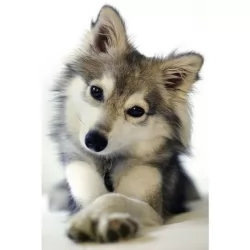 Miniature Siberian Huskies – also known as mini huskies – are your regular Siberian husky bred to be that much smaller than what the breed standard dictates.
Miniature Siberian Huskies – also known as mini huskies – are your regular Siberian husky bred to be that much smaller than what the breed standard dictates.
They’re sought after by those who love the regular sized Siberian Husky but who find the larger dog too large and boisterous. They come complete with the looks and the temperament of the Siberian Husky but they are smaller.
The origins of these gorgeous Mini huskies is conflicting though as some believe they originated in the USA. The name of Bree Normandin is bandied about when talking of the breed’s origin while other refer to Linda S. Spurlin from Alaska. She became interested in them when her full-sized husky became pregnant by a small dog.
Spurlin used Siberian and Alaskan Huskies as well as small Schipperkes and American Eskimo Dogs to bring about the mini version. They’ve got the same pedigree as the Siberian Husky, but it has been selectively bred for its smaller size, also coming from the Spitz family of dogs.
The Miniature Husky is genetically the same as the larger Siberian Husky and the AKC doesn’t recognize it as a separate breed, but sees it as a different size variation of the working-group Siberian Husky.
Dogs today come with so many looks. ‘Other’ dogs are vast and varied. They may be pedigreed dogs that are ‘off the radar’ or they may be among the many ‘cross-breed’ dogs there are.
You can get a tiny Chihuahua, measuring just 9cm in height, but you can also get a huge dog like the Great Dane that can stand at up to 90cm in height. It isn't however, a heavily built dog like the giant Newfoundland which can weigh up to 117 kg or so.
Some dogs are intelligent, others not so much. Others are social and others more reserved. Some won’t be able to tolerate being cooped up indoors and not being able to be outdoors involved in an activity, while others are more indoor dogs.
Some dog are friendly, others indifferent, some boisterous and sporty, others docile and lazy. There are so many other dogs that don’t make the pedigreed list, but they’re adored by their human family for being so utterly unique.
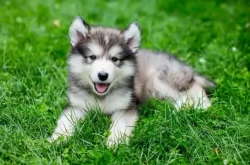 Known also as the Alaskan Klee Klai,the Miniature Siberian Husky stands at 33-39cm in height and weighs between 8 - 11kg.
Known also as the Alaskan Klee Klai,the Miniature Siberian Husky stands at 33-39cm in height and weighs between 8 - 11kg.
These mini huskies are like the larger huskies and can also come in a range of color variations such as grey and white, black and white or red and white for instance. In typical Spitz dog fashion they have the erect ears and long bushy tail. A striking feature of these dogs is the beautiful eyes – they can be brown but also a mesmerising blue.
This Miniature Siberian Husky is an intelligent dog and you’re not going to have any trouble with him teaching him some basic commands such as sit, lie-down and stay.
You need to know that these dogs aren’t going to be content lying around all day and that they want to be kept busy almost around the clock. They have always been working dogs so he will need plenty of mental – and physical exercise to keep him content. A bored, frustrated Mini Husky will just develop problem behavior through no fault of his own. People who buy high energy dogs have a responsibility towards them to keep them busy and well exercised.
These dogs are similar to their genetic ancestor, the wolf, and instead of barking, you may find him trying to communicate with a howl. One thing is sure, they make great family pets, and their gentle nature allows them to get on well with children and also not to show aggression with other dogs. They’re loyal, outgoing and charming.
There are so many dogs, some are pedigree dogs and some aren’t. Some dogs are registered with kennel clubs and others aren’t.
Every dog has some amazing characteristics that make them so adorable. These kennel clubs divide dogs into categories such as Terriers, working dogs, herding dogs, toy breeds, hounds and so on. Pedigree breeds belong to these groups.
Other dogs are just as special, even if they don’t fall into the many dog breeds recognized by major kennel clubs.
There are so many other dog breeds, and if you want to bring some canine magic into your home and heart, apart from the very many expensive dog breeds out there, there are other dogs.
These are hybrids or true one-of-a-kind pavement specials that come at a fraction of the price but with the most amazing and wonderful characteristics you can imagine and which will make a most splendid pet.
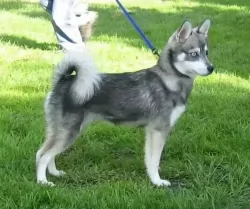 Your cuddly Mini Siberian Husky is such an intelligent dog, active and social and guaranteed to make you a splendid pet.
Your cuddly Mini Siberian Husky is such an intelligent dog, active and social and guaranteed to make you a splendid pet.
Being somewhat wary and aloof with strangers, they also make good watchdogs. They do well with children who have been taught to be kind and gentle with animals.
With good care your dog can reach up to 15 years of age, providing you with many years of superb friendship.
Other dogs are considered somewhat healthier than purebred dogs because they come from a broader gene pool. Nonetheless you still need to be aware of certain dog illnesses that your dog can develop -
This is a common ailment in dogs, and skin allergies can cause your dog a lot of discomfort and pain. They lick and lick and aggravate the situation. Sometimes fleas, chemicals and dog shampoos can aggravate the skin too. There are several things to look at – from making environmental changes to changing your dog’s food.
Cancer is common in dogs, just as in human beings, with there being a number of different cancers. Whenever you brush your dog, run your hands over him to check if there are any unusual lumps on him and have them examined if you do discover a lump.
Other dog illnesses to watch out for include bloat, ear and eye infections, cataracts, hip dysplasia and obesity, among others.
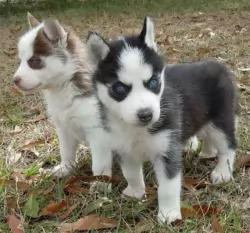 Your Miniature Siberian Husky is a healthy dog and you won’t have to spend too much money on him at the vet. However, just like with any other dog, he can battle with some of the common dog diseases -
Your Miniature Siberian Husky is a healthy dog and you won’t have to spend too much money on him at the vet. However, just like with any other dog, he can battle with some of the common dog diseases -
This eye problem affects about 10% of all Siberian Huskies and its not limited to old dogs. Juvenile cataracts can affect young dogs too. Luckily the problem isn’t painful for the dog.
Skin problems can be a concern for the Mini Siberian Husky, especially as one is used to seeing these dogs with thick coats. Follicular dysplasia is a genetic condition that causes patchy hair loss as well as a scaly, infected skin.
Check out that your dog is receiving nutritious food with vitamins and minerals as a zinc deficiency for instance can cause hair loss as well as skin problems.
Responsible dog owners know that their dogs require adequate food and water, lots of love and attention, exercise, a warm, dry bed, shelter from the elements when outdoors and medical attention when they’re sick.
One advantage with other dogs which aren’t pedigreed, is that by their very nature, they have good genetic diversity, and this means good overall health. Other dogs breeds are generally cheaper to buy and cheaper in terms of vet’s fees as they tend to be healthier.
Other dogs have a variety of different coat types, so whatever dog you have, you’ll need to be looking at brushing him, stripping him or having him professionally clipped. Whether erect or floppy ears, check inside for infection. The eyes will also need to be checked for infection and other eye ailments. All dogs will also have to have their nails clipped.
The size of all dogs, pedigree or other will determine the amount of food you give him. Big or small, pedigreed or other, every dog wants the same when it comes to diet. They want food which is nutritious, tasty and simple. They want a high quality commercially manufactured food high in minerals and vitamins.
They will benefit from some raw meat added into the kibble whenever its possible. They will also require some home-made food – simple, uncomplicated homemade food such as boiled chicken, brown rice or pasta and vegetables such as sweet potato, carrots and spinach. Such a diet will keep your pet free from digestive problems. Make sure he has a constant supply of cool, fresh water.
Exercise is important for every dog, but some dogs will require more exercise than others. Some dogs will be content with a walk every day while others will require far more – running beside you while you cycle, swimming, a run in the park, rope- and ball games and going with you on hikes.
Exercise is both entertaining for your dog and healthy too.
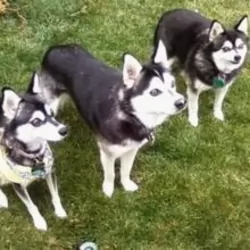 The Miniature Husky is an active and energetic breed that is going to require a lot of exercise. He is able to adapt to life in the city or the countryside but wherever you keep him as a pet, he will require regular daily exercise.
The Miniature Husky is an active and energetic breed that is going to require a lot of exercise. He is able to adapt to life in the city or the countryside but wherever you keep him as a pet, he will require regular daily exercise.
These dogs are used to cold climates so make sure your Mini Siberian Husky doesn’t overheat. Make sure that when he’s outdoors, there is shade for him and a water bowl. You’ll be doing him a real favor if you provide him with a small paddling pool to dip into on a hot day.
These are clean, odorless dogs that actually require little human help to be groomed. You can give your dog a good brush twice a week.
Mini Siberian Huskies, like the larger breed, have a high metabolism, so small amounts of highly nutritious food will do well with them. If you intend feeding your one commercially manufactured food, make sure its the high quality food that comes with plenty of minerals and vitamins. Try and avoid the low quality brands that come packed with unhealthy preservatives and colorants.
Dogs do well on simple, nutritious diets, so some boiled chicken, brown rice and raw and cooked vegetables such as carrots, potatoes and spinach added into the dry kibble from time to time will do him wonders.
Also try and include some raw meat into the kibble from time to time. That's it, as simple as that- no exotic, spicy foods and foods which we humans eat such as nuts, chips and chocolate – all can be toxic for your pet and just give him an upset stomach.
Make sure fresh, cool water is constantly available.